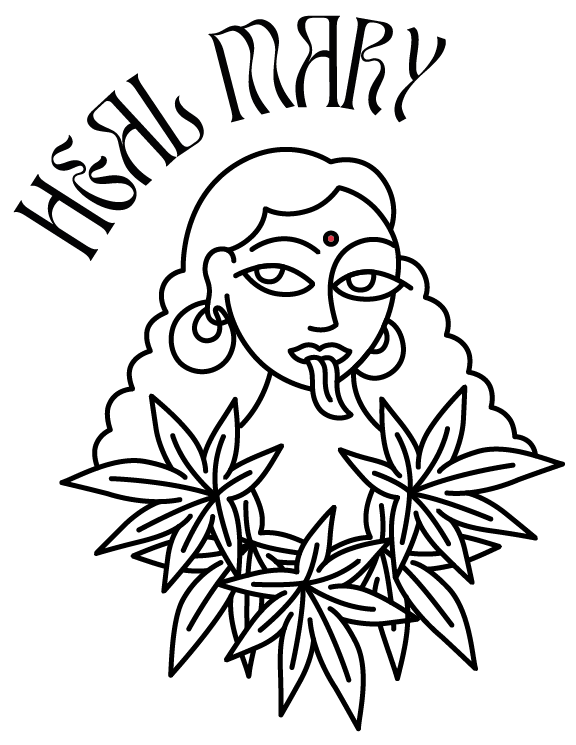Our newest product (pre-order it here!) is a formula with CBD and Ashwagandha, developed for complaints such as stress, anxiety and fear. We asked Ayurvedic therapist Taylie Hu what's so special about Ashwagandha
What is Ashwagandha?
Ashwaganda is scientifically known as Wihania Somnifera. An herb that has been used for centuries in traditional Ayurvedic medicine. It is used as an adaptogen, meaning it is believed to help the body adapt to physiological and psychological stress and stress-related conditions. Ashwaganda is also known as the 'Indian Ginseng'. It is one of the few Ayurvedic herbs on which a lot of scientific research has recently been done.
The benefits attributed to Ashwagandha are:
- Stress and anxiety: Ashwagandha can help reduce stress levels and anxiety. It can reduce the production of stress hormones such as cortisol. Increased levels of cortisol are associated with stress responses. It contributes to a feeling of relaxation and tranquility, due to its calming effect on the nervous system.
- Sleep improvement: The herb can improve sleep quality, provide deeper sleep and help reduce insomnia. It promotes relaxation and can extend sleep time.
- Immune support: Ashwagandha is used to strengthen the immune system and improve resistance to disease. It is a natural antioxidant. It is widely used to improve body strength and immunity.
- Anti-inflammatory properties: It has anti-inflammatory properties, which may be beneficial for people with conditions related to inflammation. It can also be used for muscle pain and wound healing.
- Energy and stamina: Ashwagandha can contribute to increased energy levels and endurance. It has an anabolic effect (it prevents muscle breakdown and stimulates protein production in the muscles). It improves blood circulation and can help reduce fatigue.
- Hormonal balance: Ashwagandha may increase testosterone levels of the male sex hormone. In turn, this may contribute to improved libido and sexual function in men. Traditionally it is used as an aphrodisiac, which means that it can increase sexual desire. This effect is attributed to its stress-relieving properties and ability to increase energy levels.
- Cognitive function: There is some evidence that Ashwagandha may improve cognitive function and support memory.
It is important to mention that Ayurveda talks about whole herbs and not individual chemicals. The same herb, given in different doses, in a particular way, can produce different effects. Depending on which effect of the many you want to bring out dominantly, Ashwagandha is traditionally given in dry powder form, together with warm milk, ghee, honey or lukewarm water.
Dosage
- Powdered form 3-6 grams spread over the day
- Capsule 250-500mg once or twice a day
- Heal Mary Drops 3 drops twice a day (guideline, advice from Heal Mary)
Ashwagandha is warming and can therefore increase pitta. Taking it on an empty stomach for people with a pitta constitution can cause heartburn. The advice is therefore 30 minutes after eating.
The appropriate parts of Ashwagandha are the roots and berries. It contains several active ingredients, including alkaloids (isopelletierine, anaferine), steroid lactones (withanolides, withaferins) and saponins. Some of the withanolides are similar to ginsenosides of ginseng. The pharmacological effects are analgesic, antipyretic, anxiolytic, immunomodulatory, sedative, antihypertensive, anti-inflammatory and antioxidant effects.
Nowadays, Ashwagandha is widely used in the sports world because of its anabolic effect. Anabolic processes contribute to the growth, recovery and repair of muscle tissues after exercise, such as strength training. Often used for muscle pain.
To enjoy the stress-reducing effect of Ashwagandha, it is recommended to take the powder with warm milk before going to sleep. This provides a sleep-inducing and calming effect. When taken with lukewarm water in the morning, Ashwagandha has an energetic and constructive effect. This is the magic of Ayurveda.
Tip from Heal Mary: if you take the drops in the evening, drink a mug of warm (vegetable) milk or chai afterwards. If you take them during the day, drink a glass of lukewarm water after taking them.
Combining ashwagandha with CBD is theoretically possible. It is important to consult carefully with a healthcare provider and monitor the body's response to these natural medications. Effects can vary from person to person, depending on factors such as the dosage, the form in which they are taken and individual sensitivity.
It is known that Ashwagandha can interact with anti-diabetes drugs, thyroid medications and antihypertensives. Furthermore, it is not advisable to take Ashwagandha during pregnancy, with active rheumatism and with a growing tumor.
Written by Taylie Hu, Ayurvedic therapist. Founder of Conscious Mudi.









